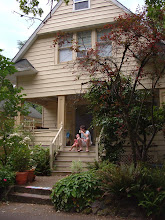In both cases, it'll be tight quarters and awkward in the way that is part and parcel of traveling and staying with loved ones. Hotel rooms, though sterile, are easily commandeered and made into some facsimile of home--on a family trip to Astoria, I remember setting up a decent mobile office in our hotel room bathroom in the middle of the night during a bout of insomnia. Same with cabins, tents, condos, and other vacation rentals that are rented solo: family swoops in with bags of stuff, drops stuff everywhere, and proceeds to figure out a system of living in a temporary dwelling. Family unfolds and fills up the space around it.
It's harder to swoop in and unfold in the borrowed spaces that belong to our others. A different thing happens here: rather than shaping a space into an image of ourselves, we assimilate, as best we can, into a home's rhythms and systems. It's an unusual kind of on-the-fly homemaking that shows up in things as small as how to hang a roll of toilet paper or whether to use a sponge or rag to wipe up spills in the kitchen, and as large as whether a family eats meat or how parents discipline their children. Traveling and staying with other people, no matter how well you know them, can be a small-scale anthropological experience--and good practice in testing the rigidity of our boundaries, expectations, and values.

But travel also reminds us that our ideas of home are portable, even though our dwellings generally are not. I remember one incident that made me realize how complex SB's (and, I'm willing to bet, most children's) understanding of home is. When she was not quite two, we rented a rustic two-room cabin in Silver Falls State Park that was really nothing more than two closets: one with a bunk bed and double bed squeezed in together and another with a counter top, fold-down table, and futon. The bathroom and shower were through the woods and up the road a bit, perhaps 100 yards away. This is a picture of SB and her dad enjoying a campfire in our "living room."
SB loved being able to roam the grounds around the cabin, digging in the dry dirt with a stick, climbing the slightly bent fir in front of the deck, collecting rocks and gravel and pine cones and putting them in a paper bag. The cabin was one of three on a cul de sac where cars sometimes wandered, lost and misguided, looking for the campground proper or another set of cabins. We had to show SB that, unlike in the city, the road wasn’t separated from the “not road” by a curb—that the two blended together and she needed to be careful. It’s funny how quickly she learned the geography of that new place. When she wandered toward the road that first afternoon and we called to her, she turned, faced us, pointed to the cabin, and said, “Home,” before moving back toward us.
Though she'd identified the cabin as "home," she really only accepted it as such because Alex and I and all of our stuff--green blanket, sheep, toys, food, clothes--were there. Home, to her, could be both a place and a set of people and things. In many ways, it's simply the relative center of the world on any given day, in any given city, which is a nice way to think of things when you're on the road.
Happy travels, everyone.




No comments:
Post a Comment